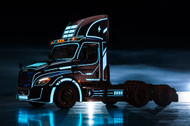The Future of Freight: The Rise of Electric Semi-Trucks
Posted by: Duaparts on

Electric semi-trucks, also known as electric freight trucks, are becoming increasingly popular as transportation companies look for ways to reduce their carbon footprint and meet sustainability goals. With the ongoing focus on reducing greenhouse gas emissions and the increasing demand for sustainable transport options, electric semi-trucks are expected to play a significant role in the future of logistics.
The transition to electric semi-trucks is already underway, with several companies working on developing electric trucks that are capable of hauling heavy loads over long distances. These trucks are powered by large batteries that provide them with the necessary range to cover long distances without needing to be recharged frequently.
One of the most significant advantages of electric semi-trucks is their environmental impact. They emit zero greenhouse gas emissions, making them a greener alternative to traditional diesel-powered trucks. This has significant implications for the environment and public health, as diesel-powered trucks are a major contributor to air pollution, which is responsible for numerous health issues.
Moreover, electric semi-trucks are also more cost-effective in the long run. While they are initially more expensive to purchase than traditional trucks, their operating costs are significantly lower, as they require less maintenance and fuel. This means that companies can save money on fuel and maintenance costs, as well as reduce their carbon footprint.
Another advantage of electric semi-trucks is their quiet operation. Traditional diesel trucks are known for their loud engines, which can be a nuisance to people living near highways or shipping ports. Electric trucks, on the other hand, operate almost silently, making them a more appealing option for logistics companies that want to reduce noise pollution.
Despite the advantages of electric semi-trucks, there are still some challenges to be overcome. One of the biggest challenges is range anxiety, as electric trucks are still limited by the range of their batteries. While many electric trucks can cover several hundred miles on a single charge, they still require frequent recharging, which can be a logistical challenge for shipping companies.
However, several companies are working on solutions to this challenge, such as developing more efficient battery technology and building out charging infrastructure. Tesla, for example, is planning to build a network of Megachargers that can charge their electric semi-trucks to full capacity in less than an hour.
In conclusion, electric semi-trucks are poised to play a significant role in the future of logistics. They offer a greener, more cost-effective, and quieter alternative to traditional diesel trucks, and many companies are already investing in their development. While there are still some challenges to overcome, the future looks bright for electric trucks, and we can expect to see more of them on the roads in the years to come.

